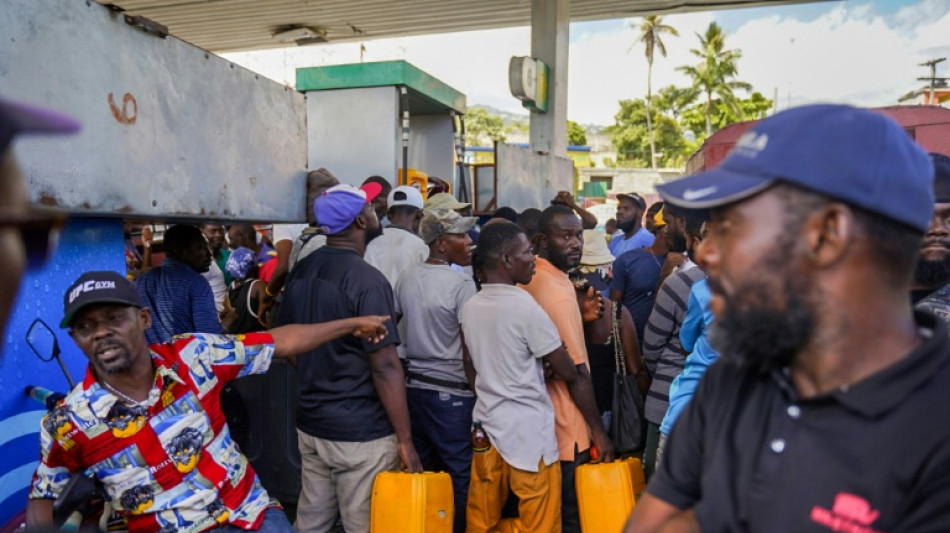
-
 Global warming is a security threat and armies must adapt: experts
Global warming is a security threat and armies must adapt: experts
-
Can Europe's richest family turn Paris into a city of football rivals?

-
 Climate campaigners praise a cool pope
Climate campaigners praise a cool pope
-
As world mourns, cardinals prepare pope's funeral
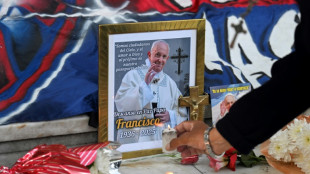
-
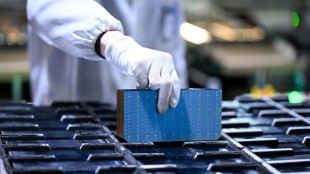 US to impose new duties on solar imports from Southeast Asia
US to impose new duties on solar imports from Southeast Asia
-
Draft NZ law seeks 'biological' definition of man, woman
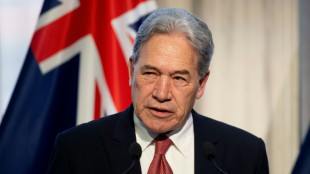
-
 Auto Shanghai to showcase electric competition at sector's new frontier
Auto Shanghai to showcase electric competition at sector's new frontier
-
Tentative tree planting 'decades overdue' in sweltering Athens

-
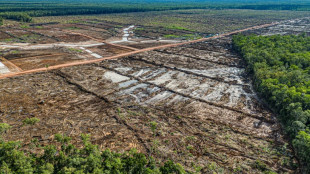 Indonesia food plan risks 'world's largest' deforestation
Indonesia food plan risks 'world's largest' deforestation
-
Gold hits record, stocks slip as Trump fuels Fed fears

-
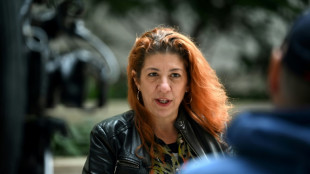 Trump helps enflame anti-LGBTQ feeling from Hungary to Romania
Trump helps enflame anti-LGBTQ feeling from Hungary to Romania
-
Woe is the pinata, a casualty of Trump trade war
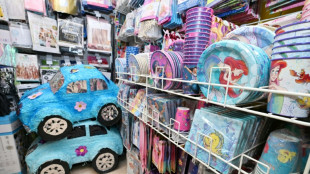
-
 'Like orphans': Argentina mourns loss of papal son
'Like orphans': Argentina mourns loss of papal son
-
Trump tariffs torch chances of meeting with China's Xi

-
 X rival Bluesky adds blue checks for trusted accounts
X rival Bluesky adds blue checks for trusted accounts
-
China to launch new crewed mission into space this week

-
 Morocco volunteers on Sahara clean-up mission
Morocco volunteers on Sahara clean-up mission
-
Latin America fondly farewells its first pontiff

-
 'I wanted it to work': Ukrainians disappointed by Easter truce
'I wanted it to work': Ukrainians disappointed by Easter truce
-
Harvard sues Trump over US federal funding cuts

-
 'One isn't born a saint': School nuns remember Pope Francis as a boy
'One isn't born a saint': School nuns remember Pope Francis as a boy
-
Battling Forest see off Spurs to boost Champions League hopes

-
 'I don't miss tennis' says Nadal
'I don't miss tennis' says Nadal
-
Biles 'not so sure' about competing at Los Angeles Olympics

-
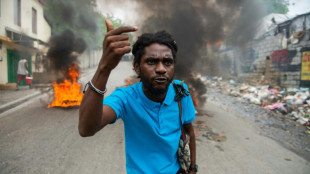 Gang-ravaged Haiti nearing 'point of no return', UN warns
Gang-ravaged Haiti nearing 'point of no return', UN warns
-
US assets slump again as Trump sharpens attack on Fed chief

-
 Forest see off Spurs to boost Champions League hopes
Forest see off Spurs to boost Champions League hopes
-
Trump says Pope Francis 'loved the world,' will attend funeral

-
 Oscar voters required to view all films before casting ballots
Oscar voters required to view all films before casting ballots
-
Bucks' Lillard upgraded to 'questionable' for game 2 v Pacers

-
 Duplantis and Biles win Laureus World Sports Awards
Duplantis and Biles win Laureus World Sports Awards
-
US urges curb of Google's search dominance as AI looms

-
 The Pope with 'two left feet' who loved the 'beautiful game'
The Pope with 'two left feet' who loved the 'beautiful game'
-
With Pope Francis death, Trump loses top moral critic

-
 Mourning Americans contrast Trump approach to late Pope Francis
Mourning Americans contrast Trump approach to late Pope Francis
-
Leeds and Burnley promoted to Premier League

-
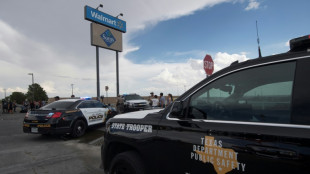 Racist gunman jailed for life over US supermarket massacre
Racist gunman jailed for life over US supermarket massacre
-
Trump backs Pentagon chief despite new Signal chat scandal

-
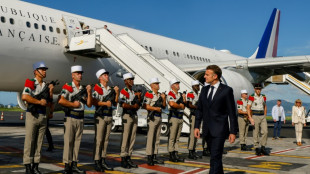 Macron vows to step up reconstruction in cyclone-hit Mayotte
Macron vows to step up reconstruction in cyclone-hit Mayotte
-
Gill, Sudharsan help toppers Gujarat boss Kolkata in IPL

-
 Messi, San Lorenzo bid farewell to football fan Pope Francis
Messi, San Lorenzo bid farewell to football fan Pope Francis
-
Leeds on brink of Premier League promotion after smashing Stoke

-
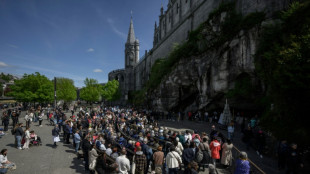 In Lourdes, Catholic pilgrims mourn the 'pope of the poor'
In Lourdes, Catholic pilgrims mourn the 'pope of the poor'
-
Korir wins men's Boston Marathon, Lokedi upstages Obiri

-
 China's CATL launches new EV sodium battery
China's CATL launches new EV sodium battery
-
Korir wins Boston Marathon, Lokedi upstages Obiri

-
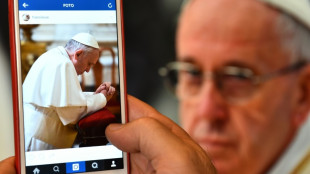 Francis, a pope for the internet age
Francis, a pope for the internet age
-
Iraq's top Shiite cleric says Pope Francis sought peace

-
 Mourners flock to world's churches to grieve Pope Francis
Mourners flock to world's churches to grieve Pope Francis
-
Trump says Pope Francis 'loved the world'


Across Haiti, fuel shortages and power outages bring life to a halt
With gang violence racking Haiti's capital, other cities across the island nation face another major issue: a shortage of both fuel and electricity threatens daily life for millions.
In addition to their deadly battles in Port-au-Prince, where at least 234 people have been killed or injured in the Cite Soleil neighborhood since early July, Haitian gangs have also hampered activity at the country's three main oil terminals.
Armed groups regularly block access to the facilities, halting the flow of fuel into the country.
In Jeremie, a coastal town on the southwestern tip of the island, gas stations have been running low on fuel for months.
Residents are forced to turn to the black market, where gasoline and diesel are readily available -- but at prices six times higher than the rate set by the government.
"You can find fuel everywhere, except in the gas stations," says Yvon Janvier, a law professor.
With little legal fuel available, and soaring black-market prices, Jeremie's least well-off residents are forced to take their journeys by foot.
The vast majority of energy in Haiti is produced by diesel-burning plants, so "it's very simple: no fuel, no electricity," says Janvier.
- One paved road -
Jose Davilmar, administrative director of the country's public electricity utility (EDH), says there are "enormous difficulties in transporting fuel to certain provincial towns."
"Most recently, three boats loaded with fuel could not dock because there were retaliations by bandits in Cite Soleil."
With control of only two short kilometers (1.2 miles) of national highway in Martissant, a poor suburb of Port-au-Prince, gangs have gained power over the flow of goods to half the country.
Armed groups have had total control over the only paved road leading to Haiti's southern regions since June 2021.
- Reduced hospital service -
Without electricity from power plants, entire regions of the country must turn to gas-powered generators to keep the lights on.
For those who cannot afford their own generator, daily life has become a headache.
In Jacmel, on Haiti's southern coast, painter Joseph Stevenson must ask among his neighbors to see who has power each time he needs to charge his phone.
"Sometimes I have to go all the way downtown to get just a few percent of a charge," says the artist.
"Can you imagine that, in the 21st century?"
In Cap-Haitien, Haiti's second-largest city, bars and restaurants equipped with generators have been able to stay open, but have reduced their hours of operation due to the rising price of gas.
The northern city's mayor, Patrick Almonor, warns that the power outages have had major impacts on medical facilities.
"Hospitals are working at a slower pace with reduced services because it has been nearly six months since the EDH has provided electricity in the city," says Almonor.
- Prices doubled -
In Les Cayes, the third-largest city, some health centers are only open a few hours a day, says doctor Kinsky Hippolyte.
The situation is largely due to the lack of electricity, but also problems transporting equipment and medicine out of the capital, 200 kilometers to the north.
Like everywhere in Haiti, the southern peninsula also suffers from sky-high inflation. But while prices have increased by more than 25 percent nationally, the southwest region has seen the prices of some food products double since the beginning of the year.
"Even the prices of local products are rising: for example, farmers are selling their lemons at a higher price to be able to buy rice, which is imported," Hippolyte says.
The doctor, who considers himself lucky compared with the country's poorest, is nevertheless obliged to "limit (his) travels because of the price of gasoline."
Haiti's rising poverty rate, compounded by social instability, is a major concern for the humanitarian community: nearly half of the country's 11 million citizens are already food insecure, including 1.3 million who are on the verge of starvation, according to the World Food Programme.
D.Schneider--BTB




